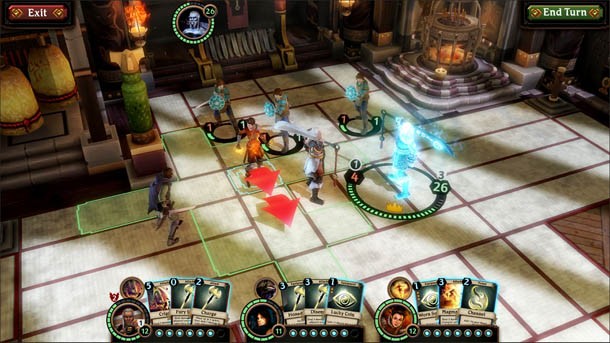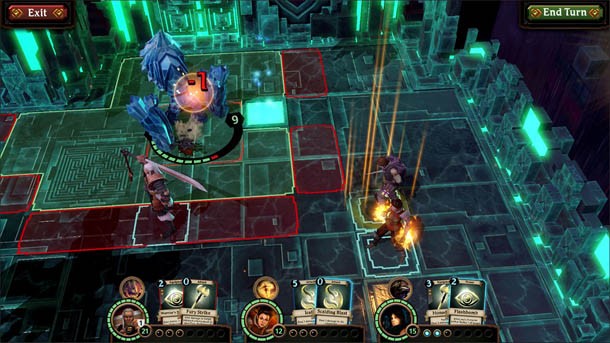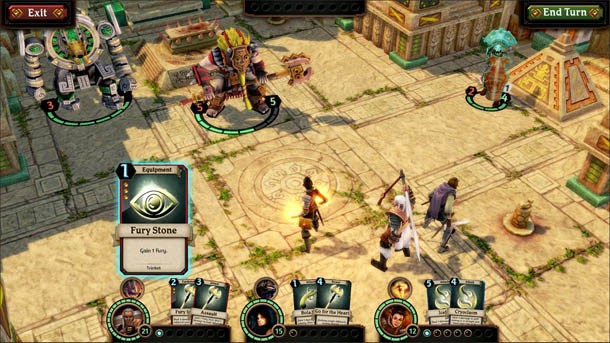Labyrinth

The astounding success of Hearthstone has kicked off a gold rush in the digital collectible-card-game genre, and upcoming games like Duelyst and 5th Cell's recently announced Anchors In The Drift are exploring ways to blend CCG mechanics into other experiences. Genre fans can add a promising new project from Free Range Games to their list of anticipated titles. Labyrinth is an upcoming free-to-play roleplaying game that sports an intriguing mash-up of deck building, turn-based strategy combat, and the ability to design and populate your own dungeon.

Cards, Combat, And Loot
At first glance, Labyrinth's gameplay will look familiar to any fan of tactical RPGs. You assemble a party of heroes and lead them through multi-tiered dungeons, taking on minions and (eventually) bosses in turn-based combat that requires deft ability management, positioning, and coordination among your team members. However, nearly everything in Labyrinth is ruled by decks. Players will build individual decks for each party member, comprised of attack, spell, and equipment cards from that character's discipline(s).
The cards in Labyrinth work differently than normal CCGs. There is no mana to manage when playing cards – instead, the numerical value on the card you play determines where in the turn order that character ends up. Perform a powerful axe strike, and your Blademaster's next turn will move further down the timeline – perhaps shuffling a few enemies further up the order. Some moves like Dodge don't cost any time, allowing the character to play it and immediately follow up with another action. In this way, attack cards essentially allow players to make powerful moves first, and then pay for them later; some magical spells flip the script, taking a few turns to charge up in advance before being carried out. Each card also dictates how many replacement cards you can draw from that character's deck to replenish their hand, further differentiating it from other collectible card games.

Like other tactical RPGs, combat also takes positioning into account. For example, a spell appropriately called The Cross spreads out in an "X" across the battlefield, allowing the casting character to hit multiple targets if properly aligned. Heroes also have a basic attack or ability that can be used as many times as he or she wants, ensuring characters never completely run out of cards.
Heroes are also acquired as cards, and sport their own unique mechanics. The Blademaster can build up fury, and then expend it with cards like Cripple, which converts the pseudo-currency into direct damage on a target enemy. In contrast, the Thief can go into a stealth mode, which makes some attacks more potent or increases the rate of success for other abilities like Dodge. The Priestess acquires devotion through her actions, which can transform spells – for instance, when leveled up, The Cross spell can restore health to allies in addition to damaging enemies.

Once you clear out a dungeon level, you can decide to leave with the loot you've already acquired or keep on going. However, if all your characters die or you're forced to flee on the next level, you'll lose your previous loot, creating an enticing risk to delve deeper for greater rewards.
Free Range Games says the loot you acquire comes in the form of gold and stardust, which is used to buy card packs containing attacks, spells, and equipment from the four main disciplines, as well as additional hero archetypes. Free Range says the currencies function similar to Hearthstone; while you can purchase gold with real money, you can still acquire every card in the game without spending a dime. You can also disenchant cards you don't want in order to craft specific cards. Also like Hearthstone, you can take on daily quests, which pay bonus loot for completing specific objectives. However, these strategic dungeon crawls are only half of Labyrinth's formula.

Dungeon Master
The dungeons you explore in Labyrinth aren't crafted by the developer – instead, you'll be looting the home bases of other players (there will, however, be solo adventures as well). When starting the game, each player is given their own dungeon, consisting of one room and a boss monster. As players progress, they can expand their lair with additional rooms, levels, and defenses. These elements, which include minions, booby traps, and other bosses, are also acquired in card packs.
Rather than squaring off against the owner of the dungeon in traditional PvP combat, the dungeon master crafts a special defense deck. When an invader enters the dungeon, that deck is shuffled, and the top card is played on each turn. In this sense, the dungeon master is basically setting up a complex web of A.I. to thwart loot-seeking parties, as the deck will play itself – the dungeon owner won't even be online when the raids take place. While the deck is shuffled, Free Range says there will be plenty of room for strategic deck building, as certain cards will chain together or affect other cards in different ways. The dungeon's boss will also draw from its own separate deck, which the owner can stack with attacks and minion summons however he or she sees fit.

The idea of getting raided by random players when you're not online can be off-putting, but don't worry – even if your invaders are successful, they're not stealing the hard-earned riches you've already banked. Instead, your dungeon serves as another source for loot, generating a given amount of resources every day based on its size. Invading players can steal from this daily allowance if they're successful, but not the money you've already banked – the worst-case scenario is you won't passively make any money on a given day. However, there's also an upside to being raided; if the player's characters don't make it out alive, you'll acquire bonus loot above and beyond what your dungeon generates. Players can also perform test runs on their own dungeon to tweak its defenses. Free Range says that there's no limit to how many dungeons you raid in a day, so even if your lair isn't up to snuff, you can still acquire more resources the old-fashioned way.

A Promising Start
Free Range Games is still a long way from releasing Labyrinth, but so far I'm intrigued by the project. I love the idea of mixing CCG elements into a tactical RPG, which simultaneously adds more strategy (in the form of deck building) and luck (in the form of card drawing) to the gameplay. I especially like the clever approach to PVP, with should make raids feel more like a single-player dungeon crawl even though you are still competing against other players. The format also ensures you'll never have to wait for the servers to find another online player to match you up with, and blowout defeats (hopefully) shouldn't be as embarrassing.
For now, my biggest question is how time-consuming/tedious it will be to build and balance the sheer number of decks you'll be playing with. Free Range says the game will launch with 300-400 cards, including 24 hero cards and 8 boss cards (plus variant bosses). Juggling different decks for each character you acquire might be a pain, but I'm encouraged by Free Range citing Hearthstone's monetization model as their inspiration – Blizzard's ultra-popular CCG strikes the perfect balance for a free-to-play game, and if anything, Labyrinth appears to be offering even more ways to generate resources without cracking open your wallet.

Labyrinth took only seven days to get approved on Steam Greenlight, which should hopefully bode well for Free Range's newly announced Kickstarter; the developer is asking for $150,000 to supplement the backing it has already acquired for the game. Free Range says it has lots of plans for the future, including team-built guild dungeons and possible live versus matches between players' parties. Free Range says it's designing Labyrinth to be a game that users play for decades – the first step in the long journey will start with a closed beta in early 2016.
Visit the official Labyrinth home page to follow along with the game's development.










